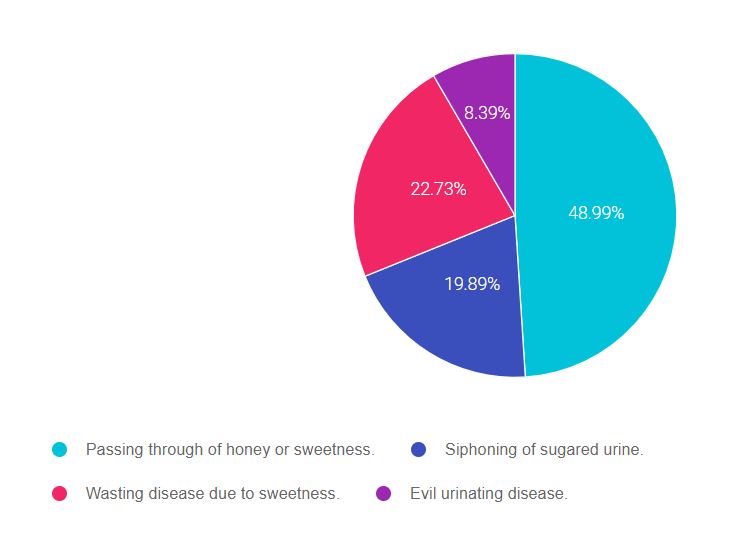
This month, we are quizzing test takers on the history of diabetes. Our November 9th Question of the week quizzed test takers on Diabetes Mellitus. 49% of respondents, chose the best answer. We are excited to share this info with you in celebration of National Diabetes Month.
Before we start though, if you don’t want any spoilers and haven’t tried the question yet, you can answer below: Answer Question
Question:
The term diabetes mellitus is derived from Greek and Latin languages, with roots dating back to the Greek physician Demetrius of Apamea in 129-199 AD.
Which is the most accurate translation of the term diabetes mellitus in English?
Answer Choices:
- Passing through of honey or sweetness.
- Siphoning of sugared urine.
- Wasting disease due to sweetness.
- Evil urinating disease.

As shown above, the most common choice was option 1, the second most common answer was option 3, then option 2, and finally option 4.
Getting to the Best Answer
If you are thinking about taking the certification exam, this practice test question will set you up for success. Test writers anticipate possible answers based on the details in the question. They will wave those “juicy answers” that seem so familiar to you, right under your nose. Your job is to weed through, eliminate FALSE answers and then choose the BEST answer.
A short history of the evolution of the term “Diabetes mellitus“
The ancient Egyptians described clinical features of diabetes over 3000 years ago. Indian physicians called it madhumeha (‘honey urine’) because it attracted ants.
However, the term “diabetes” (Greek for ‘siphon’) was first used by Greek physician Demetrius of Apamea in 129-199 AD. The findings of sweet urine and blood was first noticed by ancient Indians. A few thousand years later, the Latin word “mellitus” (‘sweet like honey’) was coined by the British Surgeon-General, John Rollo in 1798.
History of the Islets and Insulin:
Paul Langerhans, 22 and working on his medical doctorate in 1869, identified the beta cells that came to be known as the ‘islets of Langerhans’. The name insulin was based on the secretions of the islets (Latin, insula = island). The term insulin was coined in 1909 and 1910, individually by de Mayer and Schaefer, respectively. Read more in this article, The History of Diabetes Mellitus, 2013 by Ritu Lakhtakia.
Answer 1 is correct. 48.99% chose this answer, “Passing through of honey or sweetness.” YES, GREAT JOB! The term “diabetes” is Greek for ‘siphon or passing through and the “mellitus” is Latin for “sweet like honey”.
Answer 2 is incorrect. 19.89% of you chose this answer, “Siphoning of sugared urine.” This is a juicy answer, but there is no Latin or Greek word for “urine” in the term “diabetes mellitus”.
Answer 3 is incorrect. 22.73% of respondents chose this answer, “Wasting disease due to sweetness.” Another juicy answer, but there is no Latin or Greek word for “wasting disease” in the term diabetes mellitus.
Finally, Answer 4 is incorrect. 8.39% chose this answer, “Evil urinating disease.” Some people might favor this term, but the term “diabetes mellitus” only describes the passing through of honey as a medical observation. There is no judgment associated with it.
Want to learn more about this fascinating topic? Read more in this article, The History of Diabetes Mellitus, 2013 by Ritu Lakhtakia.
We hope you appreciate this week’s rationale! Thank you so much for taking the time to answer our Question of the Week and participate in this fun learning activity!
Want more practice questions? Enroll in our
Test Taking Practice Exam Toolkit Webinar
20 Sample Practice Questions
Join us live December 16, 2021, for live webinar 2022 updates

You are invited to join Coach Beverly for this FREE Webinar. And, if you want to have access to an additional 220+ sample practice online questions, you can purchase the complete Test Taking Toolkit.
For many of us, taking the certification exam is a nerve-wracking process.
During this webinar, Coach Beverly will help you transform your nervousness into focused energy that will help you succeed. She will provide test-taking tips based on her experience taking the certification exam six times.
2 Ways to Join Test Taking Webinar
Watch Webinar for FREE
This includes a review of 20 sample test questions with test-taking strategies. This does not include access to the recorded webinar or the practice questions.
Purchase for $49
This includes access to the recorded version of this webinar on your Online University Student Portal.
Plus, the Test Taking Toolkit provides you with over 220 sample online practice questions, simulating the exam experience. A perfect way to assess your knowledge and create a focused study plan, while increasing your test-taking confidence.
Don’t worry if you can’t make it live.
Your registration guarantees access to the recorded version.
Sign up for Diabetes Blog Bytes – we post one daily Blog Byte from Monday to Friday. And of course, Tuesday is our Question of the Week. It’s Informative and FREE! Sign up below!
[yikes-mailchimp form=”1″]Accreditation: Diabetes Education Services is an approved provider by the California Board of Registered Nursing, Provider 12640, and Commission on Dietetic Registration (CDR), Provider DI002. Since these programs are approved by the CDR it satisfies the CE requirements for the CDCES regardless of your profession.*
The use of DES products does not guarantee the successful passage of the CDCES exam. CBDCE does not endorse any preparatory or review materials for the CDCES exam, except for those published by CBDCE.









